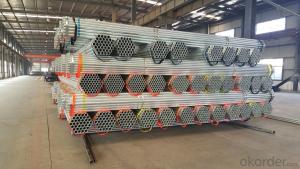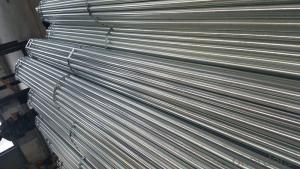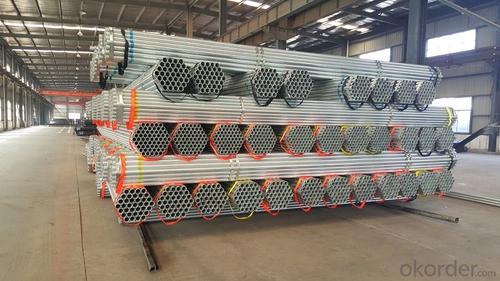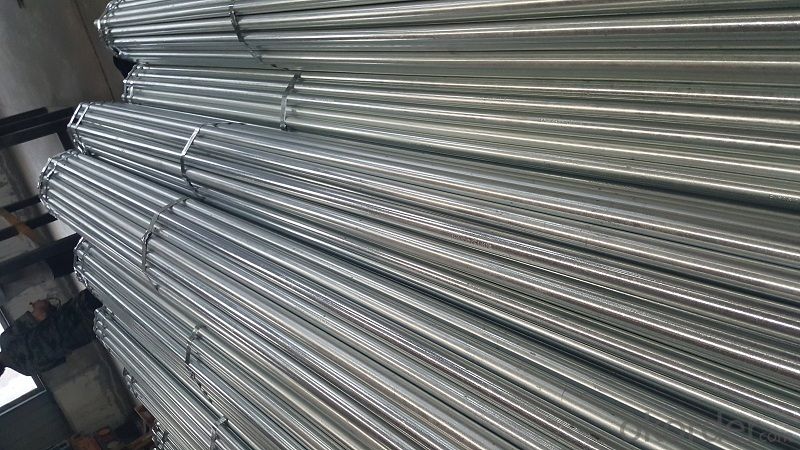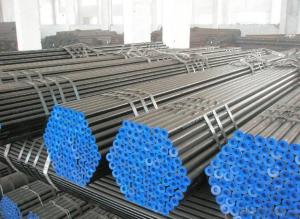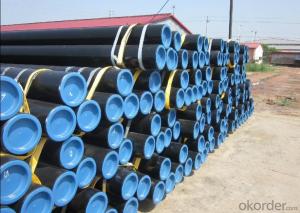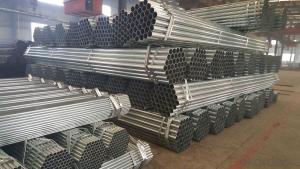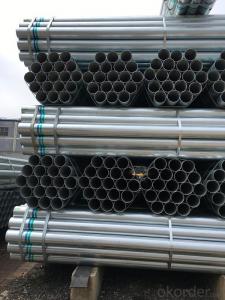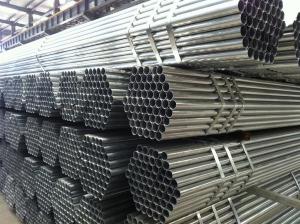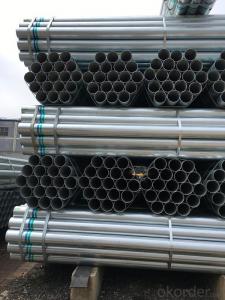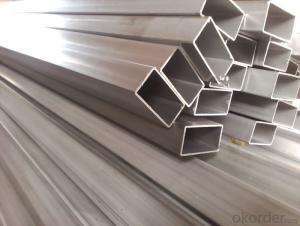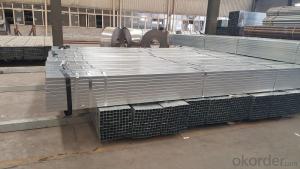Galvanized welded steel pipe for building construction
- Loading Port:
- Shanghai
- Payment Terms:
- TT OR LC
- Min Order Qty:
- 25 m.t.
- Supply Capability:
- 14000 m.t./month
OKorder Service Pledge
OKorder Financial Service
You Might Also Like
Specification
1、Structure of Galvanized welded steel pipe for building construction
:
The surface of galvanized steel pipe welded steel pipe of hot dip galvanized layer or. Galvanized can increase the corrosion resistance of the steel tube, prolong service life. Galvanized pipe is widely used, in addition to water, gas, oil and other general low pressure fluid pipelines. It is also used in the petroleum industry, especially for offshore oil field of oil well pipe and oil pipe, chemical, coking equipment of oil heater, condensation cooler, coal run oil exchanger tube, and trestle pile, the mine tunnel support frame tube.
2、Main Features of Galvanized welded steel pipe for building construction
:
• High manufacturing accuracy
• High strength
• Good visual effect
• Reasonable price
3、 Galvanized welded steel pipe for building construction Specification:
Standard | GB, DIN, ASTM ASTM A106-2006, ASTM A53-2007 |
Grade | 10#-45#, 16Mn 10#, 20#, 45#, 16Mn |
Thickness | 1 - 33 mm |
Section Shape | Round |
Outer Diameter | 21 - 610mm |
Place of Origin | Tianjin, China (Mainland) |
Secondary Or Not | Non-secondary |
Application | Hydraulic Pipe |
Technique | Cold Drawn |
Certification | API |
Surface Treatment | factory state or painted black |
Special Pipe | API Pipe |
Alloy Or Not | Non-alloy |
Length | 5-12M |
Outer Diameter | 21.3-610mm |
Grade | 20#, 45#, Q345, API J55, API K55, API L80, API N80, API P110, A53B |
Standard | ASME, ASTM |
1) Material:Q195 Q235 Q345 X42 X52
2) Specification range:OD:21.3-610mm,WT:6-70mm,length:6-12m or according to the requirement of clients.
3) Excutive standards:GB,ASME API5L.ASTM A 106/A53,Despite of the above standards,we can also supply seamless steel pipe with standard of DIN,JIS,and so on,and also develop new products according to the requirements of our clients!
4) Surface: galvanized.
5) Ends:Beveled or square cut,plastic capped,painted.
6) Packing:bundles wrapped with strong steel strip,seaworthy packing.
4、Packaging & Delivery
Packaging Details: | seaworthy package,bundles wrapped with strong steel strip |
Delivery Detail: | 15-30days after received 30%TT |
5、FAQ of Galvanized welded steel pipe for building construction
:
①How is the quality of your products?
Our products are manufactured strictly according to national and internaional standard, and we take a test
on every pipe before delivered out. If you want see our quality certifications and all kinds of testing report, please just ask us for it.
Guaranteed: If products’ quality don’t accord to discription as we give or the promise before you place order, we promise 100% refund.
②How about price?
Yes, we are factory and be able to give you lowest price below market one, and we have a policy that “ for saving time and absolutely honest business attitude, we quote as lowest as possible for any customer, and discount can be given according to quantity”,if you like bargain and factory price is not low enough as you think, just don’t waste your time.Please trust the quotation we would give you, it is professional one.
③Why should you chose us?
Chose happens because of quality, then price, We can give you both.Additionally, we can also offer professional products inquiry, products knowledge train(for agents), smooth goods delivery, exellent customer solution proposals.Our service formula: good quality+good price+good service=customer’s trust
SGS test is available, customer inspection before shipping is welcome, third party inspection is no problem.
6、 Galvanized welded steel pipe for building construction
:
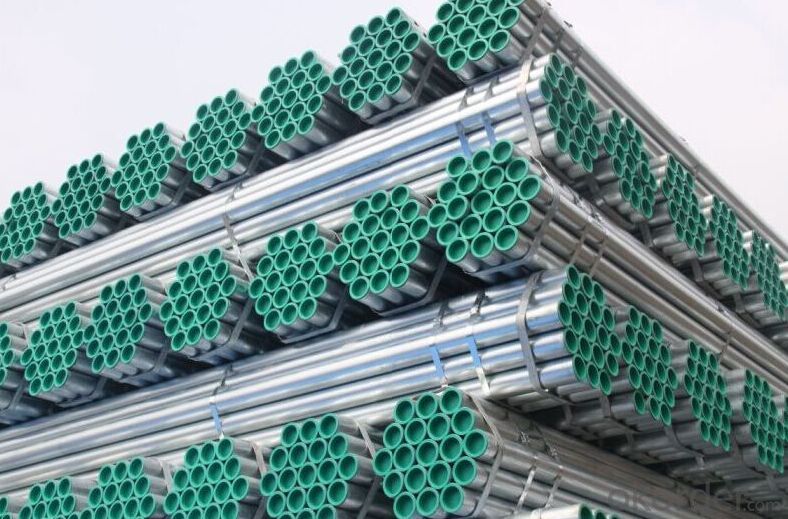
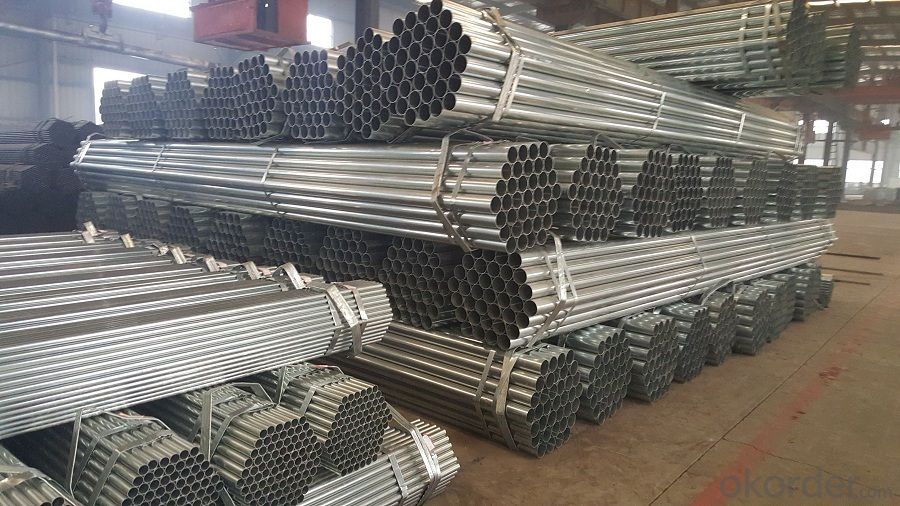
- Q: Can steel pipes be recycled?
- Yes, steel pipes can be recycled. Steel is a highly recyclable material, and the recycling process for steel pipes involves melting them down to create new steel products. Recycling steel pipes not only conserves natural resources but also reduces energy consumption and carbon emissions associated with the production of new steel.
- Q: What is the difference between steel pipes and PVC-U pipes?
- Steel pipes are made of a durable and strong material, while PVC-U pipes are made of a plastic material. Steel pipes are typically used for high-pressure and heavy-duty applications, as they can withstand harsh conditions and have a longer lifespan. PVC-U pipes, on the other hand, are lighter in weight, easier to handle, and resistant to corrosion and chemicals. They are commonly used for low-pressure applications and are more cost-effective.
- Q: What is the difference between steel pipe and fiberglass pipe?
- Steel pipe and fiberglass pipe are two different types of materials used for piping systems. One major difference between steel pipe and fiberglass pipe is the material they are made of. Steel pipe is made from steel, which is an alloy of iron and carbon. It is known for its strength and durability, making it a popular choice for various applications, including plumbing, construction, and industrial projects. On the other hand, fiberglass pipe is made from glass fibers embedded in a resin matrix. This combination results in a lightweight and corrosion-resistant material, making it suitable for applications where chemical resistance is required, such as in the chemical industry or wastewater treatment plants. Another difference between steel pipe and fiberglass pipe is their flexibility. Steel pipe is known for its rigidity and stiffness, which makes it less flexible than fiberglass pipe. This rigidity can be an advantage in certain applications where stability and strength are crucial, such as underground infrastructure or high-pressure systems. Fiberglass pipe, on the other hand, offers more flexibility, allowing it to bend and conform to different shapes and contours. This flexibility makes it easier to install in tight spaces or areas with complex geometries. Corrosion resistance is another important difference between steel pipe and fiberglass pipe. Steel pipe is susceptible to corrosion, especially in environments with high moisture or chemical exposure. To protect against corrosion, steel pipes are often coated with a layer of protective material or lined with corrosion-resistant coatings. In contrast, fiberglass pipe is inherently corrosion-resistant due to the nature of the materials used in its construction. This makes fiberglass pipe a preferred choice for applications where corrosion is a concern, such as in saltwater environments or chemical processing plants. Cost is another factor that differentiates steel pipe and fiberglass pipe. Steel pipe is generally more affordable than fiberglass pipe, especially for smaller diameter pipes. However, as the diameter and pressure rating increase, the cost of steel pipe can become significantly higher than fiberglass pipe. Additionally, fiberglass pipe requires less maintenance and has a longer lifespan, which can offset the initial cost difference over time. In summary, the main differences between steel pipe and fiberglass pipe lie in the materials they are made of, their flexibility, corrosion resistance, and cost. Steel pipe offers strength and rigidity but is prone to corrosion, while fiberglass pipe is lightweight, flexible, corrosion-resistant, and often more expensive. The choice between these two types of pipes depends on the specific requirements of the project, including factors such as the application, environment, budget, and lifespan expectations.
- Q: How are steel pipes used in the manufacturing of sewage treatment plants?
- Steel pipes are commonly used in the manufacturing of sewage treatment plants primarily for their durability, strength, and resistance to corrosion. These pipes are utilized for various purposes within the treatment process, including transporting sewage and wastewater between different treatment units, carrying chemicals for disinfection or neutralization, and providing structural support for the plant's infrastructure.
- Q: What are the common uses of steel pipes in construction?
- Steel pipes are commonly used in construction for various purposes such as carrying water, gas, and sewage, as well as for structural support in building frameworks, bridges, and underground piping systems. They are also used in the transportation of fluids and materials, making them essential in industries like oil and gas, manufacturing, and infrastructure development.
- Q: What's the difference between the fastener type steel pipe scaffold, the floor type steel pipe scaffold and the overhanging type steel pipe scaffold?
- Classification is not the only way, fastener type steel pipe scaffolding is divided by force, and the latter 2 are classified according to the structure.
- Q: Can steel pipes be used for conveying hydraulic fluids?
- Indeed, hydraulic fluids can indeed be conveyed using steel pipes. The reason behind this lies in the fact that steel pipes possess remarkable tensile strength and are highly resistant to intense pressure, rendering them ideal for hydraulic purposes. They are capable of enduring the frequently encountered high pressures and temperature fluctuations within hydraulic systems. Moreover, steel pipes boast longevity and durability, guaranteeing dependable and efficient fluid transmission in hydraulic systems. Nevertheless, it is crucial to verify the compatibility between the steel pipes employed and the particular hydraulic fluid being conveyed, in order to prevent corrosion or deterioration of the pipe material.
- Q: How to make the internal tooth of the steel pipe?
- Cylindrical thread can be used, if the tube is too long, you may consider a short tube with thread, and then welded to the long tube.Taper thread is more difficult to use than ordinary vehicle, and the tap is generally considered. The tap can be clamped on the tailstock.
- Q: Where is a steel pipe casing usually used?
- A straight tube of carbon steel sheathed on pipes and tubes and threading tubes to protect the joints from damage by electric welding. The purpose is to protect the wires and cables.
- Q: Are steel pipes suitable for potable water systems?
- Yes, steel pipes are suitable for potable water systems. Steel pipes are commonly used in potable water systems due to their strength, durability, and resistance to corrosion. They can withstand high pressure and are able to carry large volumes of water. Additionally, steel pipes can be easily welded together, making them a versatile choice for various applications in potable water systems. However, it is important to note that proper maintenance and regular inspections are necessary to prevent any potential issues such as rust or contamination.
Send your message to us
Galvanized welded steel pipe for building construction
- Loading Port:
- Shanghai
- Payment Terms:
- TT OR LC
- Min Order Qty:
- 25 m.t.
- Supply Capability:
- 14000 m.t./month
OKorder Service Pledge
OKorder Financial Service
Similar products
Hot products
Hot Searches
Related keywords
